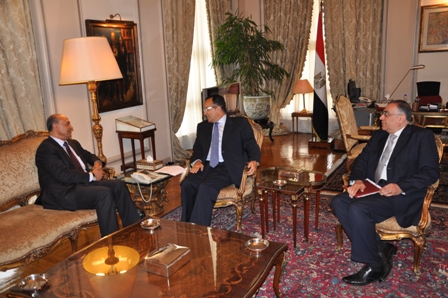By Samer Al-Atrush /AFP
CAIRO: United Nations and Arab League special envoy to Syria, Kofi Annan, warned Thursday that further militarization in Syria will worsen a conflict there that has left thousands dead in a year.
The former UN chief said he feared any miscalculation on the issue risked destabilizing the region.
“I believe further militarization will make the situation worse,” Annan told reporters in Cairo after talks with Arab League Secretary General Nabil Al-Araby.
He warned of “the possible impact of Syria on the region if there is any miscalculation.”
“I hope that no one is very seriously thinking of using force in this situation,” he said, adding that diplomatic efforts should be kept up.
Nearly 8,500 people have been killed in the almost year-long crackdown on protests against President Bashar Al-Assad’s regime, the Syrian Observatory for Human Rights says, and world pressure has been growing for a new push to end the bloodshed.
The turmoil prompted Syria’s deputy oil minister to change sides on Thursday, the first defection by a senior civilian official. Abdo Hussameldin, 58, said he knew his move would bring persecution on his family, Reuters reported.
The national Syrian currency fell as low as 100 pounds to the dollar from about 47 a year ago, according to Reuters, as dealers said the pound plunged about 13 percent in the last 24 hours on fears of US military action.
“We have to be careful that we don’t introduce a medicine that is worse than the disease,” Annan said.
He called on “the Syrian opposition to come together to work with us to find a solution that will respect the aspirations of the Syrian people.”
Syrian activists, who say calls for dialogue only give Assad more time to suppress them, bitterly criticized Annan’s remarks.
“That seems like a wink at Bashar,” an activist in the northwestern province of Idlib, who gave his name only as Mohammed, told Reuters. “They are supposed to be with the people, but this will pressure Assad to crush the revolution.”
Hadi Abdullah, an activist in the city of Homs, said: “We reject any dialogue while tanks shell our towns, snipers shoot our women and children and many areas are cut off from the world by the regime without electricity, communications or water.”
Annan has been holding talks in the Egyptian capital ahead of a trip to Damascus he said was now set for Saturday.
“We will do whatever we can to urge and press the cessation of hostilities and an end to the killing and violence,” he said earlier, ahead of talks with Egyptian Foreign Minister Mohamed Amr.
“But of course the ultimate solution lies in the political settlement,” he said.
For his part, Amr warned of consequences for the entire Middle East, should the crisis spiral, his spokesman said.
Amr said that an “explosion” of the situation “would not only have internal consequences but will spread to the whole region,” Amr Roshdy told reporters.
On Wednesday, Amr warned that arming rebel fighters in Syria, most of them army defectors, would “lead to an escalation in the military conflict and spark a civil war.”
China, one of Assad’s few friends abroad, said its envoy had given his Syrian hosts a message similar to Annan’s.
The Chinese envoy urged Assad’s government and other parties to stop the violence immediately and prodded them to let relief agencies into strife-hit areas — also the focus of a mission by UN aid chief Valerie Amos to Syria.
Syria on Wednesday “welcomed” China’s initiative, stressing Beijing’s opposition to foreign interference in its affairs. China is trying to counter Western and Arab charges that it, along with Russia, has colluded in Assad’s repression of dissent by twice vetoing UN resolutions criticizing him.
Some Arab countries, such as Qatar and regional powerhouse Saudi Arabia, have spoken in favor of arming the rebels.
The opposition Syrian National Council has said it wants to organize arms deliveries to the rebel Free Syrian Army and announced the formation of a “military bureau” to coordinate and serve as a conduit for weapons supplies from abroad.
Annan and his deputy former Palestinian foreign minister Nasser Al-Qudwa, who will head to Damascus on Saturday, are acting under a UN General Assembly mandate as well as Arab League resolutions on the crisis.
A UN General Assembly resolution passed on February 16 demands that Syria “cease all violence and protect its population,” free everyone detained in connection with the unrest, withdraw troops from urban areas and guarantee freedom of demonstration.
It also insists on “full and unhindered access and movement” for a currently suspended Arab League observer mission and international news media “to determine the truth about the situation on the ground.”
Damascus has welcomed the visit by Annan and Qudwa.
“Syria welcomes the visit by Kofi Annan, the special envoy of the UN secretary general,” state television said, citing an official it did not identify. –Additional reporting by Reuters

